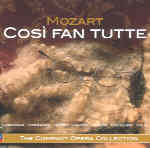I seem to recall that this was a joyless, tough-love performance of this opera, but lo, almost 30 years later it seems to wear somewhat better. Georg Solti still drives Mozart’s music in a manner that likely would surprise the composer, and not always in a nice way, but the set holds together well and the overall effect is of a fine if slightly in-your-face experience. The lengthy second-act finale builds and builds to great drama, and looking back from that vantage point, Solti’s approach is convincing. He allows the occasional embellishment to the vocal lines, his tempos tend to be right on the money, and moments of true sweetness–for instance, the sisters’ little duet that begins the first-act finale–are lovely standouts.
Some of the individual performances are simply wonderful. I can’t recall a better Guglielmo than Tom Krause, whose nicely-grained voice is used with great expression and whose characterization goes, almost visibly, from happy-go-lucky and sure of himself to “oh-no”. Similarly, Teresa Berganza’s Dorabella is a delight–softer-edged than her sister and correctly vulnerable to Krause’s advances. Gabriel Bacquier’s Alfonso, despite a tiny lack of fluency in fast passages, also is a treat–subtly snide and always suave. As usual, Pilar Lorengar is an intelligent, sensitive singer, but her vibrato gets in the way more often than not, and there’s a bit of harshness to her tone. Ryland Davies’ Ferrando is believable but lacks the tonal luxury that, when we’re lucky, comes along with this role; his “Un aura amoroso” is entirely lacking nuance. Jane Berbié’s low-rent Despina is effective. This is hardly a first choice Cosi, but it’s respectable and stageworthy, if just a bit too aggressive. The 1954 Karajan set remains ideal.
































